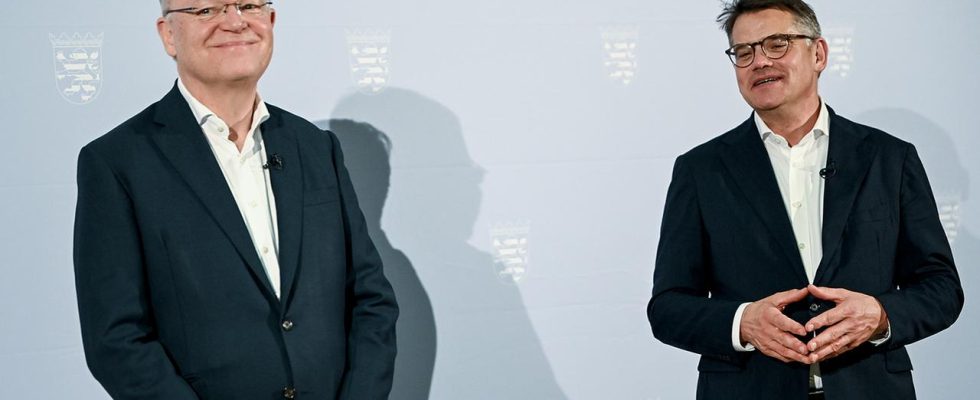The meeting with Chancellor Scholz was in a good atmosphere, but as expected there were no concrete decisions. However, the countries have a clear position on what should change in migration policy.
According to Prime Ministers Boris Rhein and Stephan Weil, the top meeting on migration policy in the Federal Chancellery took place in a “good and constructive” atmosphere. Together with Chancellor Olaf Scholz and Union parliamentary group leader Friedrich Merz, they discussed projects and measures in migration policy. Weil emphasized that the federal government, the states and the Union are close in terms of content. Now the ball is in the court of federal politics.
The Union representatives Merz and Rhein presented Scholz with “a comprehensive paper on measures to limit illegal migration”. The paper includes “a variety of national and European measures that would initiate a real change in migration policy,” said Union circles.
No concrete results were expected from the meeting. This should only happen after the next Prime Minister’s Conference on November 6th, in which Scholz is also expected to take part. Before the top meeting in Berlin, the country leaders in Frankfurt am Main agreed on a common position.
Countries want faster asylum procedures
According to the wishes of the federal states, asylum procedures for people with little prospect of staying should be processed more quickly in the future. “The federal and state governments have the common goal of completing asylum procedures for nationals of states for which the recognition rate is less than five percent more quickly than before,” says a resolution agreed upon by the Prime Ministers in Frankfurt am Main.
The stated goal is to complete the asylum procedure and the lawsuit procedure that often follows in three months. The prime ministers called on the federal government to conclude further migration agreements or readmission agreements with the relevant states and to equip the Federal Office for Migration and Refugees (BAMF) with staff for this. The federal states are also pushing for faster and more consistent returns of rejected asylum seekers, especially those who have committed serious crimes or violent crimes.
Accelerated processing should be made possible by prioritizing the processing of applications from people from countries with a low recognition rate, explained Weil. This is a practical step that has more effect than the debate that has been going on for years about which other countries should be classified as so-called safe countries of origin.
Prime Ministers demand more money
The Prime Ministers also reiterated their demand for significantly more money for the care and accommodation of refugees. “The federal government has to make significant moves here, that’s clear,” said Rhein, chairman of the Prime Minister’s Conference, after the meeting of the state leaders.
In their decision, the states demanded an annual flat rate of 1.25 billion euros from the federal government and at least 10,500 euros per migrant. He should also fully cover the accommodation costs.
Rhein’s deputy Weil said that many municipalities are financially overburdened. “If it’s difficult for the mayors, then they must at least have the impression that they are being supported as best as possible by their state.” The countries do this. “Our expectation is that the federal government will follow suit at this point.”
Demand for payment card
The federal states also want a nationwide uniform payment card for refugees. The Prime Ministers called on the federal government to create the conditions for this “in a timely manner” and “ensure that it can be implemented in the municipalities”. The federal government should also examine whether deportations could take place directly from federal facilities, such as larger airports. Weil emphasized that there was great unity in the group.
However, Bremen stated in a statement that it was against “discriminatory measures such as further work obligations that go beyond the current legal situation or payment cards that do not allow cash withdrawals.” Thuringia also did not agree with individual points.
Bavaria repeated Prime Minister Markus Söder’s (CSU) call for an “integration limit” for asylum immigration and emphasized that “legal changes, including constitutional ones”, must be examined and discussed.
Because relieved about agreement
From the perspective of Lower Saxony’s Prime Minister Weil, the states have taken an important step towards agreement on controversial migration issues. “It cannot be taken for granted that we can say at the end of this conference: We have agreed on a substantial paper on migration issues,” said the SPD politician after the Prime Minister’s Conference.
The heads of government of the federal states are very aware of the mood among the population. “We are determined to all work together to regain the public’s trust,” said Weil. The Prime Minister’s Conference proved that despite political differences, with good will, we can come together on this issue.
Habeck defends package of measures
Federal Interior Minister Nancy Faeser presented an initial package of measures on Wednesday. The SPD politician’s draft law provides for measures for faster deportations of criminals and refugees without the right to remain. At the same time, the parties in the traffic light coalition also agreed to enable asylum seekers to take up work more quickly.
The plans presented are not without controversy. The Union sees the possibility of starting work more quickly as an additional incentive to come to Germany. Habeck defended the plans. It’s about “removing pressure from the situation,” said the Green politician ARD morning magazine. The regulation will only apply retroactively to those who came to Germany by December last year, he said. Faster integration into the labor market is beneficial for everyone involved. “People should earn their own money,” he said.

